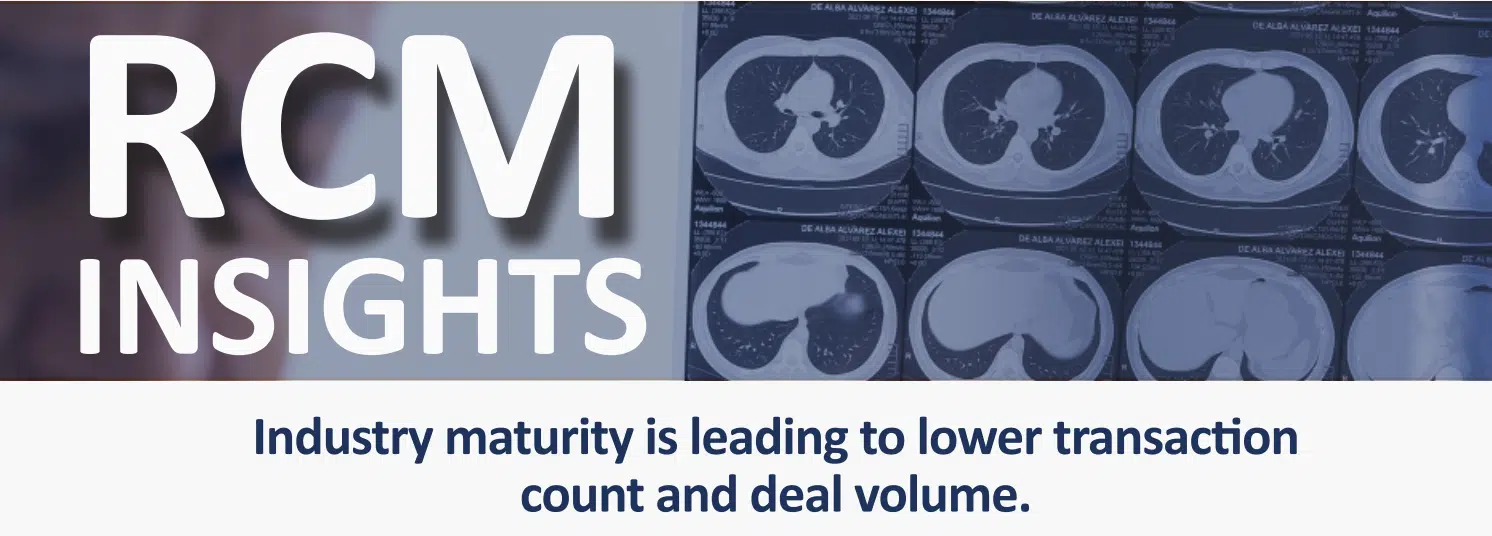Some text
Revenue Cycle Management (RCM): Industry maturity is leading to lower transaction count & deal volume.
Revenue Cycle Management companies are undergoing a transition as the large consolidators continue to hunt for point solutions to augment their “one stop shop” for outsourcing for providers. As such, deal volume and count amongst RCM companies is down in Q3 2023, however, there have been a few interesting upstart technologies raising money with unique solutions solving some pain point for providers. We at CAS continue to remain bullish on the revenue cycle management and the outlook for transaction volume over the coming 12 to 18 months.
In a positive turn of events for the U.S. healthcare sector, the article “Hospitals See Financial Relief as Revenues Increase, Margins Stabilize” by RevCycleIntelligence reveals a notable 6% year-over-year surge in hospital revenue in April 2023, a milestone since the pandemic’s onset. This welcome boost can be attributed to several key factors, including an uptick in patient volume, driven by pent-up demand and eased COVID-19 restrictions, as well as hospitals adjusting their pricing to accommodate inflation and rising labor and supply costs. Moreover, federal government financial relief has played a pivotal role in mitigating earlier pandemic-induced losses.
The article also delves into the impact of this revenue upswing on hospital margins, which have frequently been in the red during the pandemic. However, there is now a promising trend toward stabilization, with the median hospital margin registering at 0.3% in April 2023 – the first positive margin since December 2021.
While this financial resurgence is encouraging, the healthcare industry continues to grapple with challenges, including inflation, labor shortages, and escalating healthcare costs. It’s important to acknowledge that this recovery is not uniformly distributed, with certain hospitals, especially those in rural and underserved areas, still facing financial difficulties. Any point revenue cycle solutions that can come in and show an immediate lift to the bottom line in a compliant manner are receiving attention from key decision makers.
The 2023 Patient Payment Technology Report produced by Salucro reveals significant trends in healthcare billing and payment processes. Patient satisfaction with this aspect of healthcare has declined, with only 43% describing it as “great” in 2023, down from 53% in 2019. Furthermore, a substantial 68% of patients report having negative financial experiences with healthcare providers, with 53% of them leaving negative reviews, which has a notable impact on provider reputation. Billing processes remain a top consideration for patients, as 78% consider it an important factor when selecting a healthcare provider. Interestingly, 64% of patients lack confidence in the accuracy of their medical bills, emphasizing the need for more detailed statements. The report also highlights a growing demand for digital payment experiences, with 56% indicating that the availability of an online bill pay platform would influence their choice of provider, and contactless payments have seen an 11% increase since 2019.
In terms of data security, 72% of patients trust healthcare providers and partnered tech firms specializing in medical payments with their data, while only 12% trust large tech companies such as Amazon and Google. However, patient confidence in the security of online medical payments has decreased by 10% year-over-year, reaching a concerning 66%, potentially due to recent healthcare data breaches. Lastly, patients prioritize flexibility, availability, and support in their payment experiences, reflecting a strong desire for a stress-free billing process that meets their needs. This information does not come as a surprise but provides quantitative context around just how dissatisfied patients are with certain revenue cycle processes. Companies that can help providers solve some of these problems will be long term winners.
The text of the S.3103 Bill introduced on the Senate floor on October 19th by Senators Merkley, Blumenthal, Menendez & Fetterman regarding the prohibition of including medical debt on consumer report. While this is just a proposal and not formal legislation, the context is key to consider. The pendulum continues to swing away from responsibility from a consumer regarding medical care and in the relatively unknown direction of providers passing on the cost of non-payers to all. Barring medical debt from credit scores could have a number of positive impacts on borrowers. According to a Kaiser Family Foundation study, medical debt is a major factor in credit scoring for nearly 20% of Americans. This means that millions of Americans could see their credit scores improve if medical debt were removed from credit reports, but we at CAS wonder about what the cost of society this proposal would have… as there is no such thing as “free lunch”.
A range of industry stakeholders, including the American Bankers Association (ABA), Association of Credit and Collection Professionals (ACA International), U.S. Chamber of Commerce (Chamber), Synchrony Bank (Synchrony), and the National Consumer Law Center (NCLC), have issued comment letters in response to the Consumer Financial Protection Bureau’s (CFPB) request for information concerning medical credit cards and other financing products used for healthcare expenses. A key theme in their responses is the contention that the CFPB lacks the statutory authority to regulate healthcare matters. The ABA emphasizes the importance of maintaining diverse and fair healthcare payment options for consumers, highlighting the stringent regulation and disclosure requirements already in place for lending products. ACA International echoes concerns about the CFPB’s authority and its potential impact on consumers. The U.S. Chamber of Commerce underscores that financial services providers do not have a role in the healthcare system, advocating against payment regulations to address medical billing issues. Synchrony offers insights into its CareCredit product, emphasizing the value of consumer choice and the satisfaction of deferred interest plans for the majority of users.
In contrast, the NCLC focuses on risks to consumers when using medical payment products, particularly in cases where insurance could have covered the costs. They recommend stringent measures, including prohibiting charges before a medical procedure is completed. While these comments reflect a spectrum of perspectives, the debate primarily centers on the CFPB’s authority to regulate healthcare-related financial products and the potential consequences for consumers and the industry. This is yet another angle in which the revenue cycle is under a regulatory microscope, although the jurisdiction in this case of the CFPB is unclear, the impact is likely still the same (more scrutiny, increase compliance costs, less risk, etc.).
RCM Done Deals:
iCore Connect acquired Preferred Dental Services
Aspirion acquired Continuum Health Solutions
Harris Computer acquired Benchmark Solutions Co, LLC
Learn more in our latest newsletter: CAS Q3 Newsletter 2023


